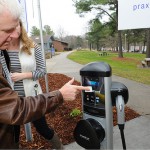Ford calls EVs the perfect second cars
Electric vehicles may be the perfect car… second car, that is. A major barrier to using EVs is inconvenience (or, at least, perceived inconvenience): drivers face the occasional dilemma of finding alternative transportation for longer trips than their EVs can make. Electric Vehicles in Multi-Vehicle Households, a recent study from Michael A. Tamor and Miloš Milacic of the Ford Motor Company, analyzes how easily two-car households in the Puget Sound area would adopt EVs.
If EVs are going to be adopted throughout the U.S., the authors point out, they must be economically “attractive” compared to typical cars. Plus, drivers will have to find convenient alternative options for long trips, when EV charging isn’t available — at least until battery and charging technology are developed enough “to enable at least 300 miles of all-weather range at a very low per-kilowatt-hour battery cost and extremely fast recharging at convenient locations – in short, all the convenience of a CV” (conventional vehicle).
Other studies on “range inconvenience” have discovered that for most drivers, “a realistic 100 mile range (EV100) is inadequate sufficiently often (on more than six occasions per year) that their willingness to accept such an EV may be doubtful unless a very convenient alternative is available.” But 65% of households in the U.S. are already two-car households. Could EVs find a home in two-car garages?
This study’s authors compared three different methods of estimating how acceptable an EV is for single- and two-car households. What does “acceptable” mean, exactly? In this case, it means that an electric vehicle is a proper replacement for a conventional car if the number of days that the EV can’t be used each year — perhaps its range is too short, for example — is lower than a given value (which ranged from one to 27 days for this study).
The researchers counted trips made by vehicles in the Puget Sound area to analyze driving data, “using actual one-day travel distances in all households including single-vehicle households”; then they “paired one-day travel distances in two-vehicle households.” They also analyzed trip information for each car in two-vehicle households.
The main discovery? EVs aren’t likely to replace cars in single-car households, but they do stand a solid chance for replacing one of two cars in two-vehicle households. As the researchers explain, “while the viability of electric vehicles as direct replacements for individual conventional vehicles faces major practical and economic hurdles, replacement of only one vehicle in a multi-vehicle household with an EV of modest range… appears to be viable at costs that are likely to be achieved in the near future.”
Unless the government intervenes — in a “massive” and consistent way, such as by providing subsidies for electric vehicles or implementing high fuel taxes — plug-in hybrid electric vehicles (PHEVs) and “modest-range” electric vehicles “will always be more cost-effective means to electrify personal travel” than general-purpose electric cars in households with more than one car.
Want to learn more? Check out one of the related studies that helped the researchers: Hybrid, Plug-in Hybrid, or Electric—What Do Car Buyers Want?
Related Posts
Category: Transportation


















